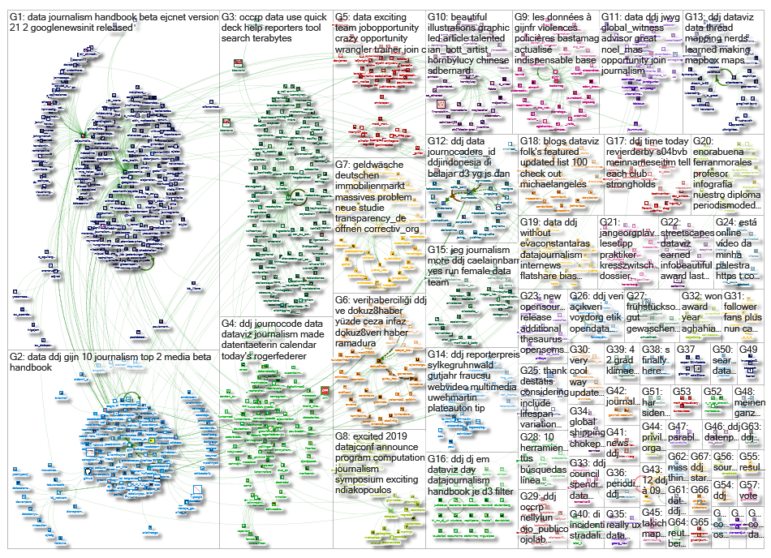What’s the global data journalism community tweeting about this week? Our NodeXL #ddj mapping from December 3 to 9 finds @BuzzFeedNews mapping wildfire prone areas across America, @dwnews dissecting the value of insurance against climate change, the release of @infobeautyaward winners, and @jschwabish teaching fourth grade kids the wonders of data visualization in fun and inventive ways.
Two Decades of Wildfires
Buzzfeed News mapped US government wildfire data from 2000, revealing areas with the highest risk. Americans can input their address and see how close the nearest fire approached, when that was and the number of acres burned.
.@paldhous always makes such interesting interactive maps. in his latest installment, you can plug in your address to find out whether your home is at risk for wildfire: https://t.co/TO0PVKjX7u pic.twitter.com/VB1zN4x4aE
— Stephanie M. Lee (@stephaniemlee) December 6, 2018
Insurance Against Climate Change
Climate risk insurance? The world’s poorest countries are being encouraged to take out insurance against climate-related disasters, but is it worth it? DW dives into how such a scheme works, digs into the data and analyzes its effectiveness.
Are climate risk insurances helpful for poor countries to adapt to the impacts of #climatechange or are they a clever way of industrialized, i.e. polluting, countries to avoid paying? Great piece by Ruby Russell and @giannagruen / #COP24 #climateinsurance https://t.co/bwr3gOvuwV
— Katharina Wecker (@katharinawecker) December 7, 2018
DataViz for Kids
Economist Jonathan Schwabish taught his youngest group yet — his fourth-grade son’s elementary school class. He tried to teach them about data visualizations and entertain them at the same time. Statistician Nathan Yau liked Schwabish’s description of the experience so much that he blogged about it.
I made it to @flowingdata. #Dataviz goal achieved. | https://t.co/Vt7ib8vQvz
— Jon Schwabish (@jschwabish) November 30, 2018
Winners: Information Is Beautiful
The Information is Beautiful Awards 2018 winners have been announced. The winners created inspiring data visualizations that “pushes the boundaries, illuminates the truth, and celebrates beauty.”
Behold: The 2018 @infobeautyaward winners are announced. Brilliant work to explore.https://t.co/p4fssjkAsZ
— Neil Halloran (@neilhalloran) December 5, 2018
Data Journalism Handbook 2 Beta Release
The Data Journalism Handbook 2 (beta version) has been released online with an initial 21 chapters. The book, produced by the European Journalism Centre and Google News Initiative, covers a wide range of topics ranging from documenting land conflicts to data journalism by, about and for marginalized communities.
Have you seen the new #DataJournalism Handbook? I love the internationalization of it in terms of content and authors. Thx @ejcnet and @GoogleNewsInit. https://t.co/d7UzkYt1OH #journalism #teaching pic.twitter.com/cnYOhN0gLg
— Kim Fox, 🎧 The Podcast Professor (@KimFoxWOSU) December 9, 2018
Open Data Worldwide
OpenDataSoft has a collection of more than 13,700 datasets. You can use the platform to store, manage, visualize, find, use and share any city’s data. And it also has a list of open data websites around the world.
Eine unheimliche gute Liste mit #OpenData-Quellen: https://t.co/PLoLeoVak8 #ddj via @daten_drang
— Recherche-Lab (@RechercheLab) December 7, 2018
Investigative Dashboard
Heard of the powerful platform Investigative Dashboard but have no idea how to get started? OCCRP’s Friedrich Lindenberg wrote a quick overview on how to use the data platform to background people and search for links between people and companies for your investigation.
Getting started with @OCCRP Data – a quick deck to help reporters use our tool to search terabytes of data, share their own documents and mine databases for leads. #ddj https://t.co/IlfpoyXuyL
— Friedrich Lindenberg (@pudo) December 5, 2018
Computation+Journalism Symposium 2019
The Computation+Journalism Symposium 2019 will be held on February 1 and 2 at the University of Miami. The two days will feature discussions on automation, information quality, algorithms, tools for reporting and storytelling and more. Keynote speakers will be Brian Hamman, Lisa Gibbs and Yphtach Lelkes.
Excited to announce the program for 2019 Computation + Journalism Symposium: https://t.co/826RuJD7nA — an exciting lineup featuring talks on automation, info quality and fact checking, algorithmic accountability, and demos of new #DDJ & #CJ tools. Join: https://t.co/nAjXsPgl1N
— Nick Diakopoulos (@ndiakopoulos) December 6, 2018
Wrangling Messy Data
Data will often be messy and peppered with mistakes, typos and other problems. TuvaLab offers free data literacy training on how to wrangle messy data, clean and analyze it. (In English and Arabic).
Ücretsiz Veri Eğitimi https://t.co/cyLPYFdhqB #ddj #dataviz #vg #verihaberciliği #verigörselleştirme #verigazeteciliği pic.twitter.com/dyZFX0NxVc
— Açık Veri Gazeteciliği PlatformuTR (@DagmedyaVeri) November 30, 2018
Prison by the Numbers
The number of prisoners in Turkey’s penal institutions and child convicts increased in 2017. Dokuz8Haber breaks down the numbers according to age, level of education and type of crime committed. (In Turkish.)
TÜİK, 2017 sonu ceza infaz kurumu istatistiklerini açıkladı: Tutuklu yargılananların sayısı hızla artıyor | | dokuz8HABER https://t.co/ErTsY1geop @dokuz8haber aracılığıyla
— Heterodoks (@heterodoks) December 10, 2018
Thanks, once again, to Marc Smith of Connected Action for gathering the links and graphing them.
 Eunice Au is GIJN’s program coordinator. Previously, she was a Malaysia correspondent for Singapore’s The Straits Times, and a journalist at the New Straits Times. She has also written for The Sun, Malaysian Today and Madam Chair.
Eunice Au is GIJN’s program coordinator. Previously, she was a Malaysia correspondent for Singapore’s The Straits Times, and a journalist at the New Straits Times. She has also written for The Sun, Malaysian Today and Madam Chair.

